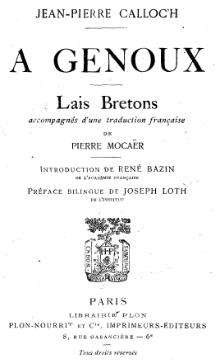Yann-Ber Kalloc'h
Yann-Ber Kalloc'h (born Jean-Pierre Calloc'h in French; 21 July 1888 – 10 April 1917) was a Breton war poet who wrote in both Breton and French.

Life
Yann-Ber Kalloc'h was born on the island of Groix, near Quimper, on July 24, 1888. He was the son of a fisherman (who was lost at sea in October 1902) and his wife. He describes his childhood in the autobiographical poem I was born in the middle of the sea. Kalloc'h at first wanted to become a Roman Catholic priest and entered the minor seminary of St Anne d'Auray in 1900, then the major seminary at Vannes in October 1905. He was forced to renounce his vocation after his two sisters and his younger brother revealed signs of mental illness, since canon law forbade the priesthood to those who had relatives suffering from such diseases. Yann-Ber had dreamed of being a missionary and his exclusion from the priesthood brought him great distress.[1]
He became tutor in various cities including Paris. During military service, Yann-Ber made a point of teaching fellow Bretons to read and write in their own language. His earliest writings were in French, but from 1905 on, he wrote in the Breton language. Taking the bardic name of Bard Bleimor (lit. "Sea Wolf", or Sea Bass), Kalloc'h wrote for various regionalist and autonomist newspapers. He used to say, "I am not in the least bit French."[2]
According to Ian Higgins, "When the war came, Calloc'h, like so many others, saw it as a defense of civilization and Christianity, and immediately volunteered for the front. Only Ireland and Brittany, he writes in one poem, still help Christ carry the cross: in the fight to reinvigorate Christianity, the Celtic people's are in the van. In addition, now readily fighting for France, he saw the war as the great chance to affirm the national identity of Brittany and resurrect it's language and culture."[3]
On October 12, 1915, he wrote a letter to Achille Collin which became the basis for a 1919 petition in favor of Breton.
Yann-Ber Kalloc'h was reportedly a terrible foe in hand to hand combat and wielded a sailor's axe formerly used in the French Navy for boarding enemy ships. His motto was "For God and Brittany". He was killed in action when a German shell landed near his dugout near Urvillers/Cerizy (Aisne) on April 10, 1917.[4]
Legacy
In Brittany, at least six streets bear his name.[5]
His name appears in the Panthéon with those of 546 other writers who were killed in the First World War.
Also, the Breton Scouting organization Bleimor is named in his honor.
In her 2009 album Uam, Scottish vocalist and folk singer Julie Fowlis performed Kalloc'h's song Me 'zo Ganet kreiz ar e mor ("I was Born in the Middle of the Sea"). The lyrics were translated from the Breton language to Scottish Gaelic.
Writings
The literary work which reveals him to be one of the greatest Breton authors is a posthumous collection, of poems often mystical, as in Ar deulin (Kneeling, War daoulin year in KLT) published by his friend Pierre Mocaer in 1925. This collection includes the famous poem Me 'zo Ganet kreiz ar e mor (I was born in the middle of the sea).
In these poems composed in large part to the front, he expresses his deep Roman Catholic faith, love of his native language and feelings in favor of Breton political autonomy.
According to Ian Higgins, "His pre-war poetry is either devotional, militantly Catholic or militantly Breton. These three strands are often spun into one. Calloc'h himself selected what he thought was the best of his work, and gave the manuscript, along with his own French translations of most of the poems. If he were killed, it was to be published, under the title Ar en deulin ("Kneeling"). (The book by L. Paulus contains further texts, including two short stories revealing a touch of humour one would not have expected from the author of Ar en deulin."[6]
Works
|
|
|
References
- Tim Cross (1988), The Lost Voices of World War I: An International Anthology of Writers, Poets, and Playwrights, page 270.
- Cross (1988), page 270.
- Tim Cross (1988), page 270.
- Tim Cross (1988), page 271.
- The names that have made the history of Brittany, 1997
- Tim Cross (1988), page 270.
- Tim Cross (1989) The Lost Voices of World War I: an international anthology of writers, poets and playwrights. Iowa City: University of Iowa Press ISBN 0-7475-0276-5
External links
| Wikisource has original text related to this article: |
| Wikimedia Commons has media related to Jean-Pierre Calloc'h. |